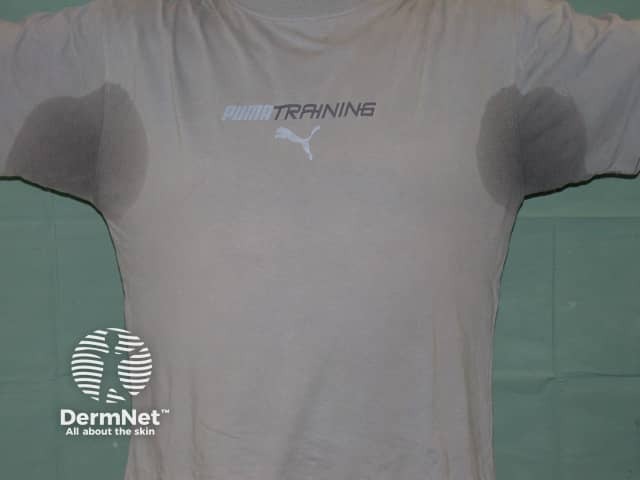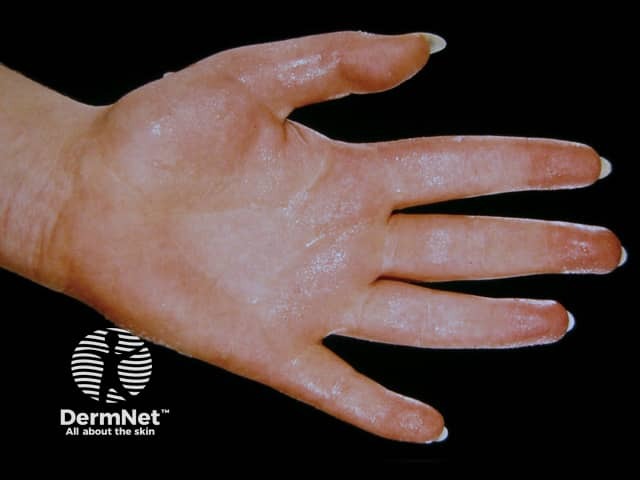Main menu
Common skin conditions

NEWS
Join DermNet PRO
Read more
Quick links
Drug-induced hyperhidrosis — extra information
Drug-induced hyperhidrosis
Author: Dr Selene Ting, Medical Registrar, Waitakere Hospital, Auckland, New Zealand. DermNet Editor in Chief: Adjunct A/Prof Amanda Oakley, Dermatologist, Hamilton, New Zealand. Copy edited by Gus Mitchell. April 2020.
Introduction Causes Demographics Hyperhidrosis-inducing drugs Clinical features Complications Diagnosis Treatment Outlook
What is hyperhidrosis?
Hyperhidrosis is excessive sweating due to the overstimulation of the eccrine sweat glands by a neurotransmitter, acetylcholine [1]. Hyperhidrosis can be primary, which happens early in life, or secondary, which is caused by systemic or neurological diseases, or as a side effect of medications.

Excessive sweating in armpits

Palmar hyperhidrosis
What leads to drug-induced hyperhidrosis?
Drug-induced hyperhidrosis is the most common cause of secondary hyperhidrosis. Drugs can act on the hypothalamus or at spinal thermoregulatory centres, at sympathetic ganglia or at the eccrine-neuroeffector junction [2]. It results from the release of acetylcholine by medications that block the action of acetylcholinesterase, an enzyme that breaks down the neurotransmitter [3].
Acetylcholine exerts its effect via receptors found on sweat glands. Due to impaired negative feedback to the hypothalamus, acetylcholine causes the body to sweat more than is needed for core temperature to reach homeostasis [2].
Who gets drug-induced hyperhidrosis?
There are no specific characteristics that increase the risk of a person getting drug-induced hyperhidrosis. It can begin at any age, and affect people of all races [4].
Other factors that can contribute to increased sweating include a family history of increased sweating, and underlying medical conditions such as obesity, diabetes, hyperthyroidism, menopause, or cancer [4,5].
What drugs can cause hyperhidrosis?
Different classes of medications can influence the sweating response by acting centrally in the brain and the peripheral nervous system [2,5,6].
Medications to treat psychiatric conditions
Medications used to treat psychiatric conditions that can cause hyperhidrosis include:
- Selective serotonin reuptake inhibitors (SSRIs), such as citalopram
- Tricyclic antidepressants, such as amitriptyline
- Antipsychotics, such as haloperidol and clozapine.
Medications to treat dementia or Parkinson disease
Medications used to treat dementia or Parkinson disease include:
- Acetylcholinesterase inhibitors, such as donepezil or benztropine
- These increase sweating through direct stimulation of receptors in sweat glands.
Medications to relieve pain
Pain relief medications that can cause hyperhidrosis include:
- Opioids, such as morphine, oxycodone, fentanyl, and tramadol
- Non-steroidal anti-inflammatory medications (NSAIDs), such as celecoxib and naproxen.
Antimicrobial medications
Antimicrobial medications and antibiotics that can cause hyperhidrosis include:
- Cephalosporins (eg, ceftriaxone or cefuroxime)
- Quinolone antibiotics (eg, ciprofloxacin)
- Antivirals (aciclovir or ribavirin).
Medications that affect endocrine function
Medications that can affect endocrine function and thus cause hyperhidrosis can include:
- Systemic corticosteroids
- Thyroid medications
- Diabetic medications such as glipizide and insulin.
Withdrawal from non-prescription drugs such as alcohol and caffeine can also cause generalised hyperhidrosis.
What are the clinical features of drug-induced hyperhidrosis?
Primary hyperhidrosis tends to occur symmetrically at sites where there are concentrated eccrine glands, such as the armpits, palms, soles of feet, and face [1].
In contrast, sweating in drug-induced hyperhidrosis is more likely to be unilateral and asymmetrical, or generalised, affecting any part of the body.
While sweating tends to reduce at night in patients with primary hyperhidrosis, it can occur during sleep in drug-induced hyperhidrosis.
The Hyperhidrosis Disease Severity Scale
The Hyperhidrosis Disease Severity Scale [7] is a four-point questionnaire to assess the impact of the condition on a patient’s daily life by selecting from the following 4 options [8]:
- My sweating is never noticeable and never interferes with my daily activities
- My sweating is tolerable but sometimes interferes with my daily activities
- My sweating is barely tolerable and frequently interferes with my daily activities
- My sweating is intolerable and always interferes with my daily activities.
What are the complications of drug-induced hyperhidrosis?
Untreated hyperhidrosis can lead to skin infections, such as pitted keratolysis [9].
Drug-induced hyperhidrosis may lead to social embarrassment, lowered self-confidence, and emotional stress [1,7].
How is drug-induced hyperhidrosis diagnosed?
Drug-induced hyperhidrosis is diagnosed clinically. Other causes of secondary hyperhidrosis should be excluded, such as an underlying infection, malignancy, neurological, or endocrine conditions [5].
A temporal relationship between initiation of a certain medication and onset of symptoms with no other apparent cause of secondary hyperhidrosis is suggestive of drug-induced hyperhidrosis [7].
A physical examination can help exclude other causes. If hyperhidrosis is active on examination, the location and pattern of sweating can help to differentiate between primary or secondary causes.
There is no laboratory test to confirm drug-induced hyperhidrosis. The Minor starch-iodine test and gravimetric analysis can be used to confirm localised sweating, which points towards primary hyperhidrosis [7].
What is the treatment for drug-induced hyperhidrosis?
When suspicious of drug-induced hyperhidrosis, the possible culprit medication should be stopped completely as a trial. Other options are to reduce the dose, change to an extended-release formulation, or substitute with another medication less likely to cause sweating.
Treatments to suppress excessive sweating include [10]:
- Topical aluminium chloride in antiperspirant
- A topical anticholinergic agent such as glycopyrrolate or oxybutynin gel
- Oral anticholinergic medication such as oxybutynin or benztropine. These are limited by side effects such as dry mouth, constipation, and blurred vision
- Botulinum toxin injections for localised hyperhidrosis (its use is approved for axillary hyperhidrosis)
- Iontophoresis, where an electric current is passed through skin soaked in water with or without an anticholinergic medication.
What is the outlook for drug-induced hyperhidrosis?
Drug-induced hyperhidrosis resolves when the causative medication is stopped.
References
- Brackenrich J, Fagg C. Hyperhidrosis. StatPearls [Internet]. 2020 [cited 26 February 2020]. PubMed
- Cheshire W, Fealey R. Drug-induced hyperhidrosis and hypohidrosis: incidence, prevention and management. Drug Saf. 2008;31(2):109–26. doi:10.2165/00002018-200831020-00002. PubMed
- Crissman K. The Most Common Medications that Cause Secondary Hyperhidrosis | My Carpe. Carpe Lotion. 2018. Available from: www.mycarpe.com/sweatopedia/the-most-common-medicines-that-cause-hyperhidrosis [accessed 26 February 2020]
- Hyperhidrosis: Who gets and causes. American Academy of Dermatology. 2020. Available from: www.aad.org/public/diseases/a-z/hyperhidrosis-causes [accessed 6 April 2020]
- Smetana G. Evaluation of the patient with night sweats or generalized hyperhidrosis. Uptodate. 2019. Available from: www.aad.org/public/diseases/a-z/hyperhidrosis-causes [accessed 26 February 2020].
- Drugs/Medications Known to Cause Hyperhidrosis. Sweathelp.org. 2009. Available from: sweathelp.org/pdf/drugs_2009.pdf [accessed 26 February 2020]
- Colvin N, Hayes H Jr. Don’t Sweat It: An Overview of Hyperhidrosis. Uspharmacist.com. 2018. Available from: www.uspharmacist.com/article/dont-sweat-it-an-overview-of-hyperhidrosis [accessed 26 February 2020]
- Hyperhidrosis Disease Severity Scale [Internet]. Sweathelp.org. Available from: www.sweathelp.org/pdf/HDSS.pdf [accessed 6 April 2020]
- Cole G. Excessive Sweating (Hyperhidrosis) Treatment, Medication, Symptoms, Causes. MedicineNet. [cited 26 February 2020]. Available from: www.medicinenet.com/hyperhidrosis/article.htm [accessed 26 February 2020]
- Schlereth T, Dieterich M, Birklein F. Hyperhidrosis--causes and treatment of enhanced sweating. Dtsch Arztebl Int. 2009;106(3):32–7. doi:10.3238/arztebl.2009.0032. PubMed Central
On DermNet
Other websites
- Hyperhidrosis — Medscape Reference
- Hyperhidrosis patient information — British Association of Dermatologists
- Hyperhidrosis — American Academy of Dermatology
- Medications Known to cause Hyperhidrosis — SweatHelp.org
- Hyperhidrosis Disease Severity Scale — International Hyperhidrosis Society
- Minor Starch Iodine Test — SweatHelp.org
- Drug-induced hyperhidrosis and hypohidrosis — NCBI (PubMed)
